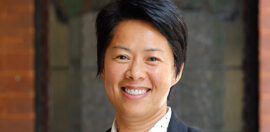EVOLVING CHAIR: From Army Chief to NFP Chair
26 November 2015 at 11:00 am
Known for a passionate 2013 speech calling for gender equality in the Australian Army, Retired Lieutenant General David Morrison has taken on the role of Chair of the Diversity Council of Australia. In this month’s Evolving Chair he talks about the need for businesses and Not for Profits to increase the diversity of their workforces.
In June 2013 a growing sexual abuse scandal in the Australian Army reached its peak when around 90 people were implicated in sharing explicit and derogatory emails.
David Morrison was Chief of the Army at the time and, after launching an investigation into the allegations of abuse, he posted a video calling on male army soldiers to respect their female colleagues.
The powerful message went viral and made Morrison an unlikely face of feminism in Australia.
He also became known for his friendship with Group Captain Cate McGregor, the highest ranking transgender person in the military anywhere in the world.
In May this year Morrison retired from the military after 36 years in the uniform. But he has decided to keep the conversation around inclusiveness and equality in Australia going.
Morrison was recently named the Chair of the Diversity Council of Australia. As this month’s Evolving Chair he says that Australia is at a “tipping point” and businesses and Not for Profits need to make diversity a priority if they are to attract the best employees.
How did you get involved with the Diversity Council of Australia?
I had a little bit to do with the Diversity Council when I was the Chief of Army. I had been given the opportunity to place a couple of senior warrant officers for six months into the DCA. We call it the talent management outpostment in the Army. We send people, officers as well as senior soldiers, out to the corporate world and to the Not for Profit sector to give them an exposure to how other people do their business. We put two really talented warrant officers into the DCA and they had a great impact and learnt a hell of a lot. I’d also been asked to speak at the Diversity Council debate, which is run annually as part of the major fundraiser.
I had a little bit to do with the DCA professionally but I think I had taken a pretty public position on the need for the army to be more diverse, both in terms of gender and in terms of racial heritage, as well as being more inclusive. So as I was approaching the end of my tenure as the Chief of Army I was contacted by two members of the board and asked if I would consider being the chair.
I had a couple of initial reservations and I expressed both of them to the board when I met with them. The first was I wondered about the look of having a 59-year-old Anglo-Saxon being the Chair of the Diversity Council of Australia, but they assured me that they thought I had enough runs on the board to pass that test and I was very grateful for that. The other concern I had was just a governance one.
I hadn’t been part of the board and they were asking me to be the Chair, but having sat in their board meeting and have a chance to speak to all of the board members as well as the executive team, allied with I’d had considerable experience in running large organisations, I thought it was a wonderful opportunity and a great privilege and I accepted it with a great deal of gratitude and open hands.
You mentioned your previous public positions, in 2013 there was that very powerful video that really went global. First of all, how do you think the situation is in the Army at the moment?
The last thing I would ever do is claim attainment of perfection for an organisation as complex and as large as the Army, and indeed there’s no perfect workplace anywhere in the world, human nature being human nature. But without doubt the culture of the Army has improved measurably and in a very short space of time relative to other organisations that have attempted cultural change. That has been not because of me but because of the extraordinary commitment of the thousands of men and women in the army uniform who’ve decided that the time is now to do something about these issues and have made, I think, a lasting and beneficial impact on the Army.
What was it that made you realise you needed to stand up and be the person to say the things that you did?
You mentioned 2013 but in fact work had been underway in the Army, just in terms of my tenure, for a couple of years. We’d set for increasing the number of women as part of the workforce, we’d completely gone back to first principles with how we were looking at merit in terms of suitability for promotion or appointment to particular key positions in the Army, we’d changed our approach to the treatment of women with regard to recruiting and retention. So all of this was already underway and I had been doing a great deal of work with organisations like the DCA, certainly with the Human Rights Commission and the Sex Discrimination Commissioner.
I had seen issues with a clarity that I had never had before. I understood, albeit perhaps late in life, and I can be criticised for that, matters pertaining to the barriers, sometimes tangible often intangible, that we put in the way of women in terms of professional progress within their careers. We were doing a hell of a lot.
The message to the Army was purely that, it was a message to the Army born out of anger and concern for our reputation and deep frustration that there was still groups within the Army who didn’t appear to get the message, because we’d spent an enormous amount of time dealing with these matters. But it wasn’t ever intended for broader public consumption, that just happened.
I’ve said continually that I find it pretty surreal that a relatively straightforward and simple message from a leader of an organisation telling his colleagues to treat each other with respect is a precondition of their employment has had so much resonance outside of not just the Australian Army, but indeed globally.
That being what it is, I think that leaders do need to make a very palpable and public commitment to increasing the diversity of their workforces, and the reason that they should do that is in part, of course, for altruistic reasons. Giving everybody a fair go is absolutely the right thing to do. But as all of the work shows, if you have a diverse workforce, and certainly one that’s inclusive, you are going to be a more productive organisation.
As I say to corporate groups that I speak to all the time now, if you’re not getting onboard this particular train, you’re going to miss out here, because the men and women who are entering the Australian workforce now, leaving school and university, see the world differently to 59-year-old Anglo-Saxon men who haven’t made the transition that I’ve made. I think they look for organisations that display a social conscience and indeed are building their social capital. Unless you are doing that you are not going to attract the talent that you need in the future for the long-term prosperity of the particular organisation or institution that you lead.
When you look at Australia more broadly, do you think the country needs to lift its game when it comes to our embracement of diversity?
Only in respect that the entire world does. I don’t think that we should beat up on ourselves too much. Australia is, by almost every measure, a country that has successfully built a multicultural society. Yes, of course there are always issues of tension, as we’re seeing at the moment, but we find in Australia a wonderfully tolerant and pragmatic way of seeing our way through these issues. That is I think to our great credit as a country and as a society.
Having said that of course, I do think that we need to realise that we’re making abject use of the talent in 51 per cent of the population – women. I don’t think that we’re gaining the talent and potential that is in the men and women of so many different ethnic groups within the country.
That’s where the Diversity Council of Australia’s got a fantastic pedigree and a great deal of information and expertise that it can provide to corporate Australia and to the Not for Profit sector as well, in terms of how to build a diverse and inclusive workforce, because that is going to improve the corporate bottom line.
Looking back, do you regret the fact that you didn’t make that conscious shift earlier?
Yes I do. I don’t want to paint myself as some sort of ogre before my “Saul on the road to Damascus” revelation, I don’t think I was. I’d been very well brought up by loving parents who really put a great deal of emphasis on respect for other people. They didn’t have a xenophobic bone in their bodies.
The real issue for me though was coming into that very senior position and through a series of meetings, conversations and circumstances, I saw that what I had assumed was a level playing field, because as a white Anglo-Saxon male that had largely been the hand that I was dealt to play, that just didn’t work nearly as well for many other people who were equally or more talented than me.
So when you’ve got stewardship of a great national institution like the Army and you see these issues, probably more clearly than you ever have before, you find that it’s a challenge that is there for you to solve, so you go about in a very imperfect but human way to try and shift culture.
I don’t think there’s anything harder than that by the way, because you’re dealing with vested interests and you’re dealing with human nature and people have obviously got concerns when you start to make these changes and they may be part of the losing team rather than the winning team. So you’ve got to come at these issues with a great deal of forethought, analysis and discussion, and then be prepared to spend time educating and communicating.
But you’ve also got to be passionate about it, and I think where we’ve seen leaders passionately embrace the advantages that accrue through creating more diverse and inclusive workforces, and there are a number of them now in Australia, men and women of real pedigree, expertise and gravitas, they can make big changes. You look at experiences at organisations like Telstra under David Thodey, or QANTAS under Alan Joyce, or some of the banks, I do think that it pulls people up, it makes us pause and think, “Ok, we’ve got a good society but we could be better, so let’s do something better.”
I think we’re at a tipping point in Australia at the moment. I think we’ve got a very large group of men and women who are entering our workforce now who are going to demand particular social issues are addressed by the organisations that they may choose to be a part of, and if those organisation demuir from that and don’t do it, I simply don’t think they’re going to get the talent they need.
Group Captain Cate McGregor is the highest ranked transgender person in the military anywhere in the world. Does that make you proud?
Yes, absolutely. It’s been achieved because she is a woman of enormous courage and integrity and the journey that she embarked on was one of enormous challenges, which she’s met in an extraordinary way. The Army lent forward to help, so has the Air Force, so have many other people outside of the military, but Cate has created the world that she now lives in and it’s a great credit to her that she’d done that.
A lot of people would expect the head of the Army to be one of the last people to embrace a transgender person, or to give these messages about cultural and gender diversity. Is it particularly important to you to make sure that you counter those expectations?
I’m just trying to be the best person I can be, defined by the values that have been instilled in me by my parents and my lovely wife and the colleagues that I’ve had throughout my military career. They have made me the person I am. I think that now that I have finished my military profession I still have something to contribute to the broader Australian society. When I was offered the opportunity to be part of an extraordinary organisation like the Diversity Council of Australia, it gave me that opportunity to continue that commitment to matters that I hold absolutely central to who I am as a person. It was wonderful to have the chance and I’m really delighted to play the small part that I’ve been given.
How would you encourage other people to consciously shift to recognise the challenges other people face in the way you have?
I think everybody has it within them to stop and reflect on their lives and the world around them. Socrates encouraged people to live the life examined and I think that’s absolutely correct. I think everybody has got that ability. When people do pause and start to think about other people and their place within the world, there is a wealth of information that points to where we could be better as a society. One of those areas is certainly being more open to the idea of diversity of gender, race, sexual orientation, colour or creed and to reach that step at a point in your life and to think, “Yes, there is something there and I could be a part of that, I could contribute and perhaps start to see the world through other people’s eyes,” that would make the world a better place. In fact it is making the world a better place because there are million of Australians and global citizens who are doing just that.
Embracing diversity deeply enriches us as human beings. I am a better man that what I was four years ago and I’m exceptionally grateful for the opportunities that have been given to me, relatively late in life, to do those sorts of things. Having seen the issues and having decided that I wanted to be a part of them while I was the Chief of the Army, that hasn’t changed since I stepped out of uniform, I just want to contribute.
I want to keep making the contribution I can because I believe deeply that this is a great country, it’s strong because of its multicultural society, it’s pragmatism and tolerance, and I think that if we can all be able to think about the benefits that we have been given by those who’ve lived before us, because we are the recipients of their legacy, we just need to pause and think about the legacy we’re going to leave for those who follow us.







